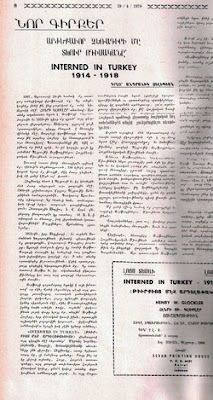Father Hamazasp Kechichian (2017)
Գերոնքը էմըն տարա, (The spring every year)Աշխէրհէս ըրվան, (All over the world)
Հայաթ կը բիրի։ (Heralds life)
Ծաղկօծ ծառիրը, (Trees flowering)
Էվչող չըտտիրը, (Birds chirping)
Կանաչ լառռօնքը, (Mountains greened)
էնօշ ծաղկօնքը, (Sweet flowers)
Սիերտիդ կը բենուն, (Invigorate the heart)
Նուր գուվօդ կու տուն։ (Give new resolve)
 |
| Gangar, an edible plant grows in the wild in Kessab early spring |
Ըմմը մի հեմօր, (However, with us,)
Ըղով ըրք տարա, (It has been three years,)
Միր աչուեն չըտըսնեն (Our eyes do not see)
Էնուշութենը գերընքվին. (The sweatness of the spring)
Չումքի մաճիրէն ըրք էմսըվին (Because with the three months of homelessness,)
Թէսըրը հա էվըլնու ուրթիլուօն։ (Misfortunes pile as time goes by)
Շուօտ մուօրդ անցով գընուօց, (Many people came by and left)
Վըրբ իթուօղ, տուօնը տէտէն, պէպկուօն (Leaving the ancesteral home orphaned)
Հընտանա, դուօր դըռացա չըմընուօց։ (Relative, next-door neighbor, did not remain)
Կանաչ Ծառիրը չարցուն, (The green trees dried up)
Պախչընէն օրման դարձուն։ (The orchards went wild)
Նա ին նա ճին հա գըտնէս, (Not a being, not a soul, do you find)
Կը խընտուօս թի թուօղը մուօրդ տըսնէս։ (You rejoice should you see a person in the neighberhood)
Ընծաս մինք եո՞ հարթունք, (Where are we heading this way?)
դըքըր ե՞րբ պըր դիմենունք։ (How long will we be able to endure?)
Սապըր հա ինինք, ըմմը հիշտ չի (We are being patient, but that is not easy
Մեվսըմը ծախիս գէն չունա, (Nothing for sale fetches income)
Պըր դետես բուն չըգըտնըվա։ (You want to work, but can’t find work)
Ճահիլնէն դուրիցի գեցեն, (The young went away)
էսքերլըքէն, իհդիադէն խելըսիլը, կարդիլը, (Either enlisted or avoiding the reserves, or for education)
եա բուն բեթվիլը, դետըլը հեմուօր։(Either looking for a job, for working)
Միրիրը տետիրը չըդիմեցուն (The mothers and the fathers could not cope)
Իրինց չուճուգնէն հառռօ մընիլիէն, (With their children being away)
Ճամբոյ իլուն իրինց իդիդիէն։ (They hit the road, after them.)
Գեցողը հայուրթու, մընեցողը հա մընու, (Those for going, leave; those for staying, stay)
Աստուօծ ալըննէն հիտ թըղ ըննու, (Let God be with them all.)
Հայ էսինք, քէչ մըլի սապըր, աղուր պըր ըննու։ (We say to ourselves, let us stay put a bit longer, things will be fine)
Աստուօծ լըսսի, ալէք բուն թըղ աղուրնու, (May God hear and let everythig be fine)
Ուվ կառնու թըղ եիտ դառնու. (Whoever can, let them return)
Չումքի առունց շըննըք առունց կենճիր, (Because without people, without the young)
Չուօց Քեսուօպը պըր պիհինք ըղիր։(How are we to keep Kessab?)
Ումուօտ կ՚ունենք, պըր ուղուրդա (We have hope that it will be alright)
Հառռունց զայիվ լօյս հա տըսնըվա։ (We see a dim light in the far)
Գուվուօդ սաղլըք քեսպըցիցը քեսպու, (Endurance, good health to the Kessabtis in Kessab)
Իրինց սայէն Քեսուօպ դառ մի հա մընու (Because of them, Kessab is remaining)
Պիտա ալէյիս բուն մը ինինք, (We should all do something)
Զօրթ մը իրինց եարտըմինք։ (And assist them a bit)
«Քէսուօպ Ղուրպուն ըննում քի» (“Kessab, I long for your”)
էսիլը իսուօր ալ հիրէք չի։ (Saying is not enough, anymore)
Պիտա տուշմըշըննունք, հուգ ինինք, (We should empathize, we should care)
Քի պարապուօր ձառ ըրկենցընինք։ (To extend an equal hand)
Քեսպըցէք կ՚ունէնք աշխուօրքիս միէկ (We have Kessabtsis all over the world)
Ըտնենք միէկըզմէկ, ճուղուտվենք, (Let us find each other, let us come together)
Ֆըրանսա, Պօրըթ, Ամիրքա (France, Beirut, America)
Իմարաթ, Աւըսթրալիա, Ͻանատա (Emirates, Australia, Canada)
Հայաստան, դըքըր Չինաստան։ (Armenia, all the way to China)
Ձառ ձառա ուտունք լելօկ, աղբար, (Let us give hands, brother, sister)
Քեսօպ հա դարկըվա (Kessab is being depopulate)
Վուօղը էնգուն կ՚ըննու, (Tomorrow will be late)
փուշմանիլը չէ ֆայտա։ (Regretting does not help)
Հեսնենք հընտենուօցը, քեսպըցիցը միր, (Let us reach out to our Kessabtsi relatives)
Եարտըմինք, սիէրտ ուտունք, (Let us assist, let us give them heart)
Եօլ գըտնենք, բուն բենունք, (Let us find a way, let us start work)
Իշինք չուօց իրինց կռնուօկ ըննունք։ (Let us see how can we back them)
Քեսօպը միր պէպկըննիրէն մարաս ի քի, (Kessab of our grandfathers is a legacy)
Ընծի, միր էվլատնէն, (To us and to our children)
Միր վըզզէն պուօրտքն ի տիէր ըննիլ (It’s our our obligation to assume ownership)
Միր լիզվէն իլան ատաթնէն, (Of our language and our customs)
Հեսցընինք զիրինք միր թոռըննէն։ (Pass them on to our grandchildren)
Translated: Vahe H. Apelian






